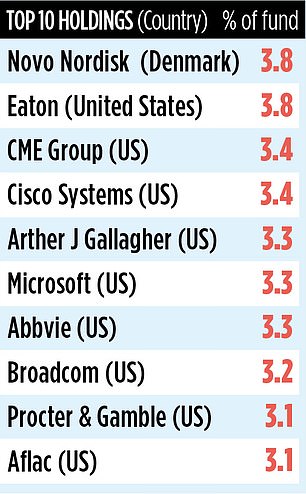GUINNESS GLOBAL EQUITY INCOME FUND: Executives give positive forecast on Fortnum's snacks
Many fund managers have been unable to ditch Zoom since the dark days of lockdown.
So it was encouraging to go to the packed Fortnum & Mason store in London ten days ago and meet the joint managers of Guinness Global Equity Income explain their investment strategy in person.
With the prospect of tea and finger sandwiches, investors – some of them wannabe investors – hung on every word as Ian Mortimer and Matthew Page explained the fund's strategy. The managers also provided an overview of the difficult economic conditions.
Despite persistent inflation concerns that just won't go away, the pair gave a fairly optimistic assessment of the fund's prospects.
In short, this year and next should provide investors with continued dividend growth. Those present left satisfied on all fronts.
The £3.6 billion fund has an excellent investment record. Since 2011, there has only been one year – 2020 – in which managers have failed to provide investors with growing dividends.
Although the fund's relative performance against its peer group has been disappointing over the past year, it has still managed to deliver a small positive total return (capital and income) for investors of 4.3 percent.
It has shown comfortable outperformance over the past three, five and ten years, with respective returns of 30, 63 and 152 percent.
Mortimer and Page are disciplined in the way they manage the fund. Unlike other managers, they prefer to distribute assets evenly across holdings.
This means that profits are regularly taken in the best performing companies to rebalance the portfolio. It also results in a portfolio – consisting of 35 stocks – where every stock matters.

Although the emphasis is on dividends, the companies that end up in the portfolio are mainly selected for their potential to generate profits through thick and thin.
All companies bought by the fund must have a minimum market capitalization of $1 billion (£794 million) and strong balance sheets.
Companies in declining industries are off-limits, as are companies that pay unsustainable dividends to shareholders. Companies not on their radar include banks, real estate companies and utilities.
All these requirements result in a pool of 600 companies from which Mortimer and Page can fish. Current positions include established brands such as US retailer Walmart and drinks giant Coca-Cola.
This also includes lesser-known names such as Australian-listed Sonic Healthcare and French digital automation specialist Schneider Electric.
The dividends the fund currently generates correspond to a modest annual income of 2.1 percent. But dividend growth is the name of the game.
This year, 31 of the fund's holdings have increased their dividends, while only one – US shoe company VF Corporation – has cut them. The average increase amounts to a tick above six percent.
After the Fortnum egg and cress fingers had been consumed, Mortimer told me personally that the fund's prospects for next year were promising.
He said: 'We expect dividend growth for the companies we own to accelerate. Balance sheets remain robust as our companies have taken advantage of the post-pandemic low interest rate regime to issue debt with low coupon rates and long maturities.
As global economic growth has outperformed this year, inflation has fallen and pricing power is robust, the profit margins of the companies we own have remained relatively stable while revenues have grown. This gives companies the opportunity to both reinvest in growth and increase their dividends.'
A cheerful end to a pleasant afternoon.
